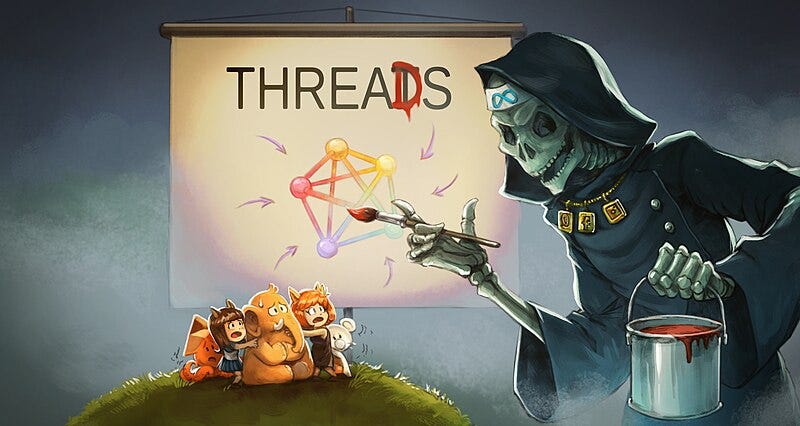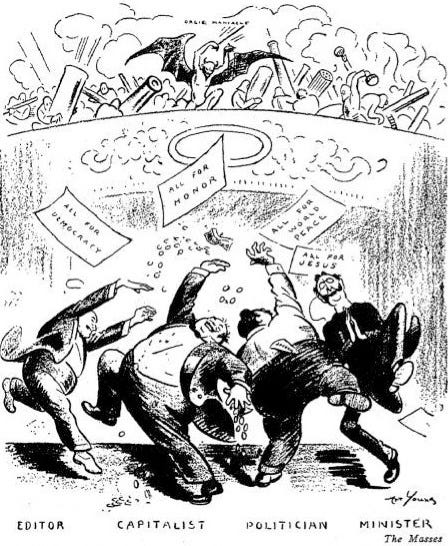Why I'm Leaving 'Fediverse' — Distributed Privatisation Isn't Silicon Valley's Antithesis
Not for an 'alternative' either — there is nowhere else to go. This is an archive of a journey, a reflection on its coming end, and rumination about a better digital future.
Before we begin, I want to make something clear: I won’t join any other 'alternatives.' There are no good alternatives right now. I value my human dignity to even consider switching to any Silicon Valley platform like Threads/X, and the only reason why I am writing this on Substack is so that this is archived within public gaze (so, this is a temporary account, don’t follow).
This is also not only because Pixelfed or prominent instances [servers] on Mastodon are federating with Threads, although that was something I warned about long before and expected to happen. Whether I can block the threads domain or not is irrelevant.
The core reason why I am leaving is this: you can’t fix social problems with technological solutions — distributed privatisation in lieu of centralised privatisation is still privatisation. Tech won’t save us
A new horizon for social media is Public Service Media — which the Fediverse is not — which I will explain later in this writing. Currently, this does not exist in any form. Yes, Fuchs has written about the possibility of the Fediverse being Public Service Media; but my article is written in disagreement with that. I don’t agree with every single thing any person says — no one’s word is gospel.
Social/political problems require social/political solutions — and I initially expected the ‘Fediverse’ (an MCU-reminiscent term that never appealed to me) was organised under such principles when I first joined. I had deleted/replaced Twitter, Instagram, Facebook, Reddit, and Gmail long before. However, this is not the case — even if these platforms are better than Silicon Valley’s enshittifying data-harvesting panopticon.
Obviously, I am not the first one to write about “leaving Mastodon” or its discontents (ironically, the author of this article said they’ll stick around nevertheless, but then got fed up and left 2 weeks later); but I always felt that these writers never touched the political heart of the issue, often waxing lyrically about technicalities or platform culture — completely missing the point (see core reason above).
This is a painful decision — as it was when I left behind Silicon Valley platforms — because once again, this sacrifices the readership I’ve built and the friends on this platform; but at this point, I care more about principle than these. I’ll explain some concepts and get into the ‘why’ later — and finish off with what 'Public Service Media' is.
This writing isn’t to call those who use Fediverse platforms rubes; I am writing this from a place of empathy as another person who also wanted a better alternative to Silicon Valley’s data panopticon and advertising cesspool but did not find it in the federation. This is an obituary.
What do you mean, 'distributed privatisation?'
Distributed privatisation is a term I contrived to describe the interactive dynamics of capital and labour within these federated systems. It better describes the scene than 'decentralisation,' a term that encourages a false dichotomy between 'centralisation' versus 'decentralisation.'
Its definition, in this context, is this: a system where capital/user interaction is distributed across several intercommunicating networks (distribution), but the ownership and operations of capital/labour are centralised under private ownership (privatisation).
In other words: the 'Fediverse' is a distributed system where anyone can create a server/instance/application that can communicate with each other — and users can pick (and restrict) any among the multitude to customise network experience. This pitch sounds 'democratic,' until you factor in something else:
Only those with the capacity to meet the capital and labour demands of storage, bandwidth, maintenance, and moderation can best engage in this system.
That means 5 things:
Those with existing wealth can outperform others in this ecosystem
It empowers the wealthy over the others: you can host your own servers and interact with the network — but because capital costs are fixed, the opportunity cost is greater for those who earn less.
Capital and labour — hosting/storage and moderation — become centralised in any instance, because most people won’t/can’t afford to self-host (or pay for third-party hosting/storage services).
Centralisation of resources and labour leads to a centralisation of power in each open-to-public server among this distribution — the owners and developers have final say over all decisions because it is their servers, apps, and resources, not yours
Cooperatively led servers within this ecosystem can’t compete with network domination and economies of scale by entities like Meta, and are still bound by capital requirements
In other words, the haves can inevitably dominate the have-nots — privacy policies, network programming, and infrastructure can all change if the owners and developers in control will it to. And there is not a damn thing you can do about it if you can’t afford to.
Why is this not a good thing?
If you are reading this as someone who has invested so much time and energy into this ecosystem, I’d like you to momentarily let go of your attachment and/or sunk-cost feelings and think about this:
Most of the userbase is concentrated — by unintentional design — into a few large servers with private owners
Privacy policies, algorithm behaviour/implementation, code, moderation policies, etc. are all dependent on human decisions, and can be changed in a heartbeat
Consider point number one and two, and then consider that the userbases are at the mercy of their server owners and their whims — much like how people are with Silicon Valley platforms
“Host your own instance” is an unrealistic ask, as this assumes the person has money to spend on maintaining all mandatory recurring costs
These problems seem trivial until one day, a corporation like Meta is at your door — which is today, actually. Before we continue this discussion, factor in these points:
Meta is a for-profit corporation honour-bound to fiduciary duty
Meta’s profitability relies on advertisements and, by extension, tracking you
Meta has a track record for unspeakable evil (and Metaverse shenanigans)
This leaves, as one user points out, the whole network vulnerable to an Embrace/Extend/Exterminate operation (read this article, the historical parallels are uncanny). The point, for me, isn’t federating or not federating with Threads or the individual choice to block the domain; rather, it is that the network infrastructure is inherently vulnerable to these tactics. It was one of my first concerns when I joined.
Threads, by far, would constitute Mastodon’s biggest instance. Interoperability on their playing field with such a densely concentrated userbase into a few handful of instances means they can obliterate the network and uproot all angles of privacy — by circumventing them through web-scraping (which may already have happened, don’t forget that they created shadow profiles for non-Facebook users), by dominating the network and siphoning in users, and by persuading server owners to compromise.
Again, the point isn’t whether people federate with them or not; the point is that this is a consequence of distributed privatisation — it is all about privacy and consent until one day, it is not… and there are no built-in social mechanisms to protect against this or make server owners choose what its users want for the servers.
Saying “you can block threads” misses the point — the point is that the users cannot meaningfully enact what they want as a collective for their platform because there is no mechanism that allows them to do so, no avenue for negotiation, and nothing that prevents further acts of overriding consent for other things (such as privacy) at whim besides switching instances and legal action, which most people cannot individually afford.
If invoking the “legal action” argument, let’s ask ourselves some questions: most of us were on Silicon Valley platforms, which means most of us were exposed to the data tracking panopticon: how many of us have taken legal action against this? How many of us can afford to? And how many of us can win a prolonged legal strong-arm contest?
Not many, that’s for sure.
Lastly, “you can influence decisions through donations” is not a good look, because effectively, you are saying “wealth is power.” Not that donating to your instance hosts is a bad thing — actually, in ideal network conditions, this would be a good thing — but if your only mechanisms of accountability are wealth and presence, then it empowers the influence of those with greater wealth. Comparing this network to Wikipedia is a false equivalence as they are completely different in function.
Can we call this a democracy?
The comparisons to democracy — with anything and everything, not just the Fediverse — are dime-a-dozen. I have only far too often read descriptions of this ecosystem as democratic, which I think stems from a misunderstanding of what a democracy actually is.
I’m more interested in democratic function more than democracy as a metaphor.
The ability to choose between one instance or the other or create your own is only as democratic as the ability to choose between, say, Facebook and MySpace or creating your own platform…which is not democratic at all.
It makes sense, though, that those raised in capitalist democracies assume that democracy must mean the ability to choose between more products or services rather than collective/equitable agency over their socio-economic and political dynamics.
Democracy is not a scale — you can’t use it as a synonym to mean “more free” or “less free.” Freedom is an important element in democracy, but it is not the ultimate determinant. Freedom shouldn’t, for example, mean “freedom of hate speech” or “freedom to abuse” or “freedom to exploit.” Democracy is a political function, and those functions are either implemented or they are not.
A democratic outlook on social media has already been written recently by Christian Fuchs and Klaus Unterberger: The Public Service Media and Public Service Internet Manifesto: a public service internet of the people, by the people, and for the people that takes collective ownership and representation into account as well as have legal/political frameworks for accountability and equitable influence.
What that looks like is a subject open for discourse, as the manifesto provides the principles and foundations rather than political/organisational structure — and it needs to be worked on by a collective at a global scale, and most importantly, the mechanisms required to bring this to fruition are political and social, not technological.
This is what I feel the manifesto needed to highlight:
The efforts needed are political. The mechanisms required are political. At the very least, such a network needs to guarantee the following:
Democratic mechanisms for userbases to influence or negotiate platform decisions besides wealth
Political mechanisms for userbases to negotiate and discuss who runs the platform and how besides wealth
Social mechanisms to counter Sybil accounts and fascist infiltration into these mechanisms
Meeting these requirements, on top of creating Public Service Media, would have its own several challenges to overcome.
As it stands, the Fediverse has none of these beyond choosing what platform you’re on, picking what platforms you block, and creating your own platforms/instances — which doesn’t pan out well against a capitalist backdrop for reasons discussed above.
All of these are pointless without real-world socio-political action separate from technology too, which includes:
Creation of robust moderation, privacy, data-protection, and safety laws that prohibit any form of commercialisation of data (beyond the GDPR paradigm)
Ensuring that these platforms are legitimised as public service entities
Ensuring that commercial platforms are required to communicate with these platforms and that they abide by public service media laws in point number one
Harsher consequences than fining for platforms that violate privacy/safety laws
Recognition, legitimisation, and representation of public service media by global diplomatic organisations such as the United Nations
As the manifesto also states: ensuring that public service media are free from commercial and government influence on top of all this
None of the requirements in mention — for platform changes and for real-world changes — are things you can code and invent your way into. They are political actions that require political commitment and social organisation beyond just downloading an app, blocking a domain, and choosing a server.
Why I’m leaving — and why all of your time isn’t in vain
Fediverse servers are concentrated into few instances, have no meaningful way out of the vulnerabilities and flaws of private ownership, and are susceptible to corporate influence. “Decentralisation” is not “democratisation,” and that is not an objective of most server owners or developers — or colloquially termed “FOSS-bros.”
As this space advances head-first into the corporate abyss, I do not want to wait to find out what new avenues of capitalist despair and exploitation awaits, what Meta and other organisations have planned for these people, or who gets bought out. As I point out, most instances are under private ownership. Whatever laws, privacy policies, data collection/non-collection agreements, and such exist right now are subject to change in the future at human whim. Meta advertised Facebook as a privacy alternative to MySpace.
I will leave before I am a victim again.
To those of you running your own instances, donating to your favourite ones, finding ways to develop better code and infrastructure — to those of you engaged in initiatives such as The Bad Space and FediPact — your time isn’t in vain. If you choose to spend time on this ecosystem nonetheless, you aren’t in the wrong. I could be wrong and the space may politically evolve in ways beyond my imagination; but right now, I do not have a lot of confidence in that.
You should never have to “believe” in a piece of technology. Technology also cannot fix social problems with social media — that includes honouring data privacy and consent.
Your time isn’t in vain — this whole process has created fertile ground for new discussion, provided new perspectives, and let people experiment with newer ways of imagining a digital world. That is a valuable thing. The ActivityPub protocol and the communities built thereon can perhaps evolve beyond my expectations, but that comes with a recognition of need for political and social action over the technological. Whether co-operatives find a way to circumvent everything in mention and evolve, I don’t know.
I didn’t want to spend too much time musing about ideal conditions since this is my “why I’m leaving” article.
I don’t regret meeting everyone I had met and the privilege of having the discussions I’ve had with some of you. I’m deeply grateful that the people I liked and followed eventually ended up following me months later, too. I only regret that I will leave that behind.
I’m not going anywhere else. This is the last train home.
Goodbye, and good luck. May we meet again some day.

![Mahal [Temporary]'s avatar](https://substackcdn.com/image/fetch/$s_!am47!,w_36,h_36,c_fill,f_auto,q_auto:good,fl_progressive:steep/https%3A%2F%2Fsubstack-post-media.s3.amazonaws.com%2Fpublic%2Fimages%2F46ba843e-1f0a-4a3a-b297-6066dcf9f0c9_144x144.png)




